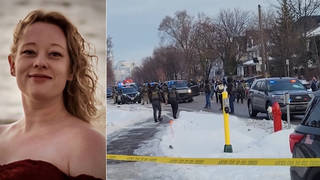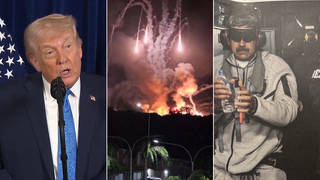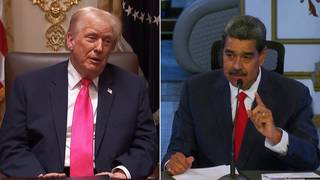
Guests
- Elizabeth Goiteinco-director of the Liberty and National Security Program at the Brennan Center for Justice.
As protests against ICE raids spread across the city, President Trump has deployed the California National Guard to Los Angeles, the first time in decades that a president has deployed the National Guard without a governor’s request. Trump’s border “czar” Tom Homan threatened to arrest California Governor Gavin Newsom and Los Angeles Mayor Karen Bass, while Newsom says he plans to sue. “This is absolutely unprecedented. It’s extremely dangerous,” says legal expert Elizabeth Goitein. “It’s going to escalate tensions rather than deescalating them.”
Transcript
AMY GOODMAN: This is Democracy Now!, democracynow.org, The War and Peace Report. I’m Amy Goodman, with Juan González.
We look more now at how President Trump has deployed the California National Guard to Los Angeles in defiance of local and state officials, after protests erupted in response to ICE conducting military-style raids in and around the city. This marks the first time in some 60 years a president has deployed the National Guard without a governor’s request. Meanwhile, Secretary of Defense Pete Hegseth has threatened to deploy 500 active-duty Marines at Camp Pendleton. California’s Governor Gavin Newsom responded on X, quote, “The Secretary of Defense is now threatening to deploy active-duty Marines on American soil against its own citizens. This is deranged behavior,” the governor wrote. Trump warned Sunday this could be just the beginning of deploying troops into U.S. streets.
Is all of this a violation of the Posse Comitatus Act. That’s the question of lawyer Elizabeth Goitein, who is the co-director of the Liberty and National Security Program at the Brennan Center for Justice.
Elizabeth Goitein, thanks so much for joining us again on Democracy Now! You wrote this piece in May. You warned about the possibility of the National Guard being called up to patrol the streets. And let’s be clear: not just of L.A. The memo that President Trump has used to deploy the National Guard, and then possibly the Marines in L.A., does not mention Los Angeles, which means it could be across the country. Explain the legality of all of this.
ELIZABETH GOITEIN: Well, that’s a tough order. The Posse Comitatus Act ordinarily prohibits federal armed forces, and that includes the federalized National Guard, from participating directly in law enforcement activities, which includes activities involved in quelling civil unrest, unless Congress has expressly authorized it. Now, under the Insurrection Act, that is an authorization, a broad authorization, for the president to deploy troops to quell civil unrest or to enforce the law in a crisis. But as broad as that law is, the Department of Justice has historically interpreted it much more narrowly in keeping with the Constitution and tradition. And basically, the rule is that the military should not be deployed except as an absolute last resort in situations where state and local officials are either just completely overwhelmed and ask for help, or the state and local officials are sitting back and doing nothing and sort of letting the problems unfold, which is pretty much what happened during the civil rights era.
Now, President Trump hasn’t even invoked the Insurrection Act, which is this exception to the Posse Comitatus Act. He is using an obscure law in a way that it has never been used before. It is questionable whether this law constitutes a sort of an independent waiver of the Posse Comitatus Act. He is also relying on a claim of inherent constitutional authority to deploy troops to protect federal personnel and property and functions. This is an executive branch claim that’s been made for decades, but in the sort of robust form that this claim is being made now, it has not been tested by the courts, so there are definitely legal questions. And at bottom, under any law or any legal theory, it is not appropriate to authorize the deployment of federal troops anywhere in the country where there is either a protest against ICE activity happening, whether or not there’s any violence involved, or where a protest is likely to occur — in other words, the protest isn’t even happening, let alone have reached a point where it’s overwhelming state and local authorities. And that’s what this order purports to do. This is absolutely unprecedented. It’s extremely dangerous. And again, it would be an abuse of any law that the president was relying on.
JUAN GONZÁLEZ: Well, Elizabeth, you mentioned during the civil rights era. There were numerous or several instances of National Guard or U.S. military being called into the South: in Little Rock in 1958; in 1962, in the rioting against the admission of James Meredith to the University of Mississippi; and again in 1965 in Alabama. What were the reasons then that the federal government used?
ELIZABETH GOITEIN: Right. In those situations, the state or local authorities, in some case — in some cases, they were the problem, such as in Little Rock, Arkansas, where the governor basically said, “The Arkansas National Guard is not going to let this happen. They are going to block the desegregation of schools in Little Rock,” despite the fact that there was a federal court order requiring desegregation. And then, so, in some cases, it was literally the case that the state and local authorities were causing the problem, and they were rebelling against the authority of the United States. What President Eisenhower did in 1957 was that he federalized the Arkansas National Guard and then ordered them to stand down and sent active-duty armed troops into Little Rock to enforce the desegregation order.
And then, in other cases, there were, you know, people exercising their civil rights, marchers, protesters who were being threatened by white mobs and attacked by white mobs who opposed their civil rights. And the state and local authorities would do nothing to protect them, and, in fact, were standing shoulder by shoulder with the white mobs. And those are the kinds of instances where deploying the military, especially back then, when federal law enforcement was — did not have the same capacity that it does today. And so, deploying the military was not only appropriate, but necessary in those cases.
JUAN GONZÁLEZ: And I wanted to ask you: What are the powers of Governor Newsom to stop this or to object to what is going on?
ELIZABETH GOITEIN: Well, it’s important that he object, and he has been objecting. He’s been saying — he’s not only been saying, you know, this is unlawful, but he has also — or, in so many words, but he has also been saying this is dangerous. This is going to be inflammatory. It’s going to escalate tensions rather than deescalating them. We want safety for everyone in this scenario. We want peace, and we want calm. And frankly, before the National Guard arrived, things had really settled down, and things were peaceful. They were stable. And the governor said, “If you deploy the National Guard, it’s going to be very incendiary, and things are going to erupt, and that creates a public safety problem.” And we are seeing that. I mean, that is exactly what has happened.
I mean, one of the reasons why we don’t have the military enforcing the law and serving as domestic police in this country is because it’s not their job, it’s not their training. You know, our military is the best fighting force in the world, and they are trained to fight and destroy an enemy. They are not trained — and within the National Guard, most of them are not trained — they don’t have this extensive training that police officers have in exactly this endeavor, which is to handle civil unrest with civilian populations in a manner that respects constitutional rights and in a manner that, you know, is going to deescalate rather than make things worse. Now, I’m not going to say that it happens perfectly and that the police, you know, are always acting as a model of this. But when you introduce soldiers into the equation with their very, very different training and mission, then it really does increase the risks, not only to the civilians, but actually to the soldiers themselves. So, that is still another reason why we don’t have soldiers, rather than just defending and protecting the United States against, you know, hostile foreign powers, turning their power against people inside this country.
AMY GOODMAN: Very quickly, Elizabeth, we just have a minute. Our previous guest, Ron Gochez, said that the governor, Governor Newsom, could tell the National Guard to stand down. That’s my first question. Number two, Homan has threatened to have both Bass, the mayor of Los Angeles, and the governor arrested, and the governor said, “Go right ahead.” Your response to both?
ELIZABETH GOITEIN: It’s such a shame that we are in the situation where we have to have comments like this. I think what — unfortunately, I’m afraid that what we are likely to see is a continuing sort of escalation of the situation. But I think there are legal remedies here. As I said, there are, you know, very serious legal questions about the president’s memorandum. And it is possible for people who have been directly harmed by this, and, you know, also for states that are in this position, to bring legal challenges, and hopefully something like that can maybe bring an end to what we are seeing.
AMY GOODMAN: And we thank you so much for taking the time. I know you’re extremely busy at this moment as you take on the question of is this a violation, when they talk about calling out the Marines, when they deploy the National Guard, to the Posse Comitatus Act. Elizabeth Goitein is co-director of the Liberty and National Security Program at the Brennan Center for Justice.
Next up, the Israeli Navy commandos have intercepted a humanitarian aid flotilla making its way to Gaza. On board, among others, Greta Thunberg. Stay with us.
[break]
AMY GOODMAN: The Brazilian activist Thiago Ávila on board the Freedom Flotilla Coalition boat that’s the name Madleen.












Media Options